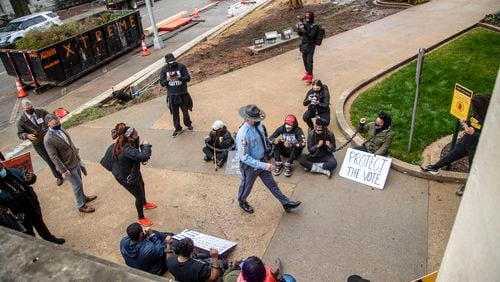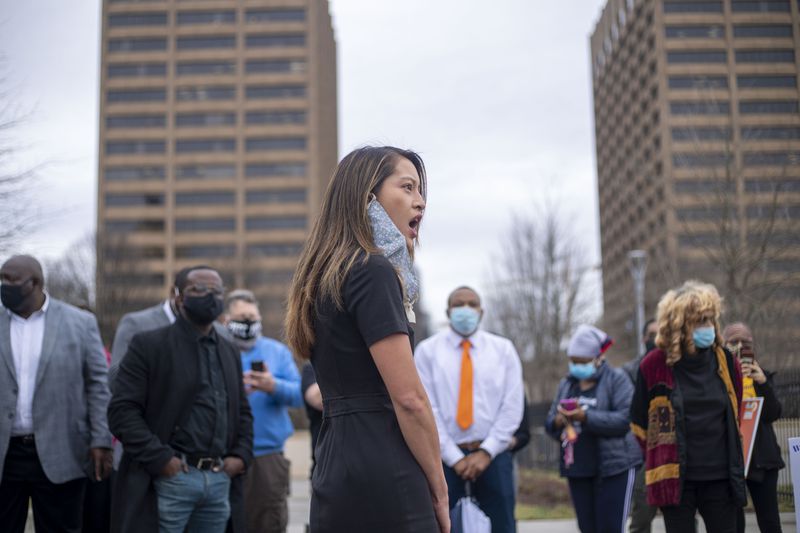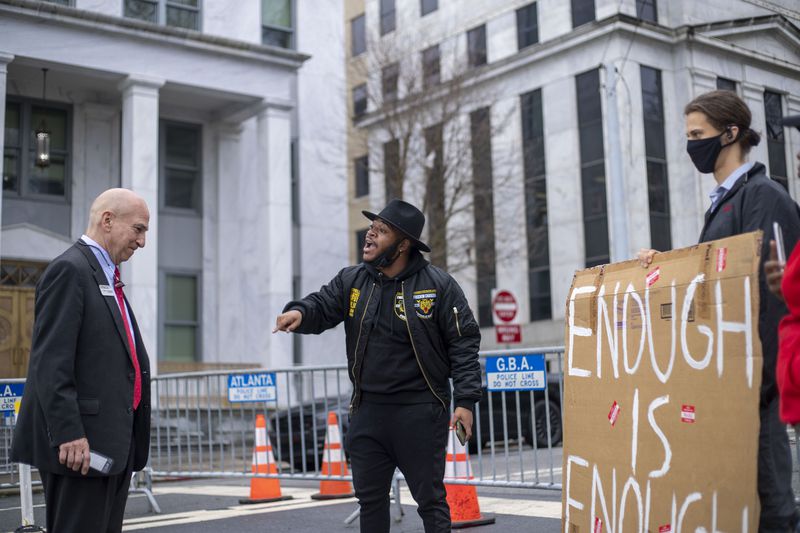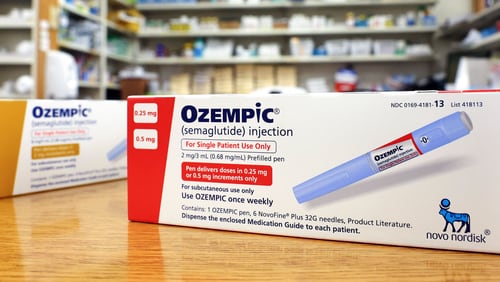This story was first published on March 4 and has been updated with additional comments from corporations.
Under pressure from civil rights activists, some of Georgia’s biggest companies and their allies at the Capitol are taking a guarded approach toward election measures that would limit weekend early voting days, curb absentee voting and add other restrictions at the ballot box.
The corporate titans aren’t standing in fierce opposition to the restrictive voting proposals moving through the Legislature, much like they did in 2016 when they rallied against a “religious liberty” measure that critics blasted as discriminatory.
But they aren’t exactly staying silent either, which was the stance most corporate leaders took during the 2019 debate over abortion legislation that divided Georgia lawmakers.
Instead, the state’s leading corporate interests are somewhere in between, issuing support for equity and fairness without taking specific stances on legislation. Business lobbies waited weeks to take a public position on some of the most contentious elements moving through the Statehouse.
Coca-Cola said it would “work to advance voting rights and access” in Georgia and across the country. Delta Air Lines backed an “election system that promotes broad voter participation, equal access to the polls, and fair, secure elections processes.” Home Depot endorsed “accessible, fair and secure” elections. Likewise, Aflac and UPS touted a push for fairness and integrity.
An exception is Salesforce, the California-based tech firm that has threatened before to scale back its presence in Georgia over controversial legislation. In a statement, the company said it opposes a House measure because it would “limit trustworthy, safe & equal access to voting by restricting early voting & eliminating provisional ballots.”
The state’s biggest business boosters at first didn’t outline specific objections, though sharpened their positions in mid-March as the debate intensified.
The Metro Atlanta Chamber specifically opposed measures that would limit absentee voting, and the Georgia Chamber said it would fight provisions that “restrict or diminish voter access” in two far-reaching elections overhauls that passed each chamber.
“We continue to advocate for balanced legislation that makes voting more accessible and more secure,” said Dave Williams, a senior executive with the Metro Atlanta Chamber. “Repealing no-excuse absentee voting does little to make the process more secure, and does so at great risk to participation.”
Credit: Alyssa Pointer / Alyssa.Pointer@ajc.com
Credit: Alyssa Pointer / Alyssa.Pointer@ajc.com
The Fortune 500 companies, some of which launched campaigns stressing the importance of voting, have come under intensifying pressure by civil rights groups and Democrats to take a sharper stand against the measures advancing under the Gold Dome.
The Georgia chapter of the NAACP demanded that the state’s biggest brands stand against “a second coming of Jim Crow.” And a coalition of groups ran full-page ads in The Atlanta Journal-Constitution and other Georgia newspapers with an all-caps headline: “Corporate Georgia, will you stand with Georgia voters?”
In today’s @ajc pic.twitter.com/lsfaIufN3n
— Greg Bluestein (@bluestein) March 4, 2021
Other advocates took a similar stance after the left-leaning Popular Information reported that some of the state’s best-known firms have donated tens of thousands of dollars since 2018 to Republican state legislators who backed efforts to invalidate Georgia’s November election.
“Silence is not an option — it is time for corporations to stand with the voters who make up the new Georgia,” said Nsé Ufot, the chief executive of the New Georgia Project voter registration group. She added that businesses should “publicly oppose these anti-voting bills that pose a direct threat to voters of color.”
Either Black Lives Matter, or they don’t.
— David Dreyer (@ddreyer) March 3, 2021
Which side are you on @CocaCola @Delta @UPS? https://t.co/joVoMH3k59
And Stacey Abrams has called on community leaders to pressure companies to take more strident stands against barriers to the ballot box.
“There were businesses that were silent in the election for whatever reason. But there should be no silence from the business community when anyone in power is trying to strip away the right to vote from the people,” said Abrams, a voting rights advocate and 2018 candidate for governor. “There should be a hue and cry.”
Corporations might be wary of wading deeper into the polarizing debate for many reasons, including potentially alienating a segment of their customer base. They may also strategically hold their fire until a clearer picture of the legislation emerges; there are more than 70 measures pending, and the most comprehensive packages are likely to change significantly in the weeks ahead.
But Georgia’s CEO crowd also needs no reminder of what happened in 2018, when then-Lt. Gov. Casey Cagle blocked a lucrative tax break for Delta after the airline enraged conservatives by ending a group discount for the National Rifle Association. (The $35 million annual incentive was later revived.)
Credit: Alyssa Pointer / Alyssa.Pointer@ajc.com
Credit: Alyssa Pointer / Alyssa.Pointer@ajc.com
Gov. Brian Kemp has also not taken a vocal stance on the restrictions, aside from strongly endorsing new ID requirements for absentee ballots. His allies say he opposes limiting no-excuse mail-in voting and ending automatic voter registration, though publicly he’s stuck to milder talking points.
“It should be easy to vote and hard to cheat,” he said. “And we should have secure, accessible and fair elections in Georgia.”
Here are the full statements we’ve collected:
Aflac:
Aflac has a long history of supporting fairness and justice. The right to Vote in national, state and local elections is the cornerstone of democracy. We need to join together to ensure accessible and secure voting while preserving election integrity and transparency. As this important issue is debated in Georgia and statehouses across the nation, we expect that fairness and integrity will be the ongoing basis for discussion.
Coca-Cola
Voting is a foundational right in America, and we will continue to work to advance voting rights and access in Georgia and across the country.
We support efforts by the Metro Atlanta Chamber and the Georgia Chamber of Commerce to help facilitate a balanced approach to the elections bills that have been introduced in the Georgia Legislature this session.
The ultimate goal should be fair, secure elections where access to voting is broad-based and inclusive.
Delta Air Lines:
Delta is more than 75,000 strong — and our shared values call on us to make our voices heard and be engaged members of our communities, of which voting is a vital part of that responsibility. Ensuring an election system that promotes broad voter participation, equal access to the polls, and fair, secure elections processes are critical to voter confidence and creates an environment that ensures everyone’s vote is counted.
Georgia Chamber
The Georgia Chamber continues to engage in a bipartisan manner with leaders of the General Assembly on bills that would impact voting rights in our state. We have expressed concern and opposition to provisions found in both HB 531 and SB 241 that restrict or diminish voter access. As these two omnibus bills move through the legislative process, we will continue to work on ensuring both accessibility and security within our voting system.
Home Depot:
We believe that all elections should be accessible, fair and secure and support broad voter participation. We’ll continue to work to ensure our associates, both in Georgia and across the country, have the information and resources to vote.
Metro Atlanta Chamber
We continue to advocate for balanced legislation that makes voting more accessible and more secure. Repealing no-excuse absentee voting does little to make the process more secure, and does so at great risk to participation.
UPS
UPS believes in the importance of the democratic process and supports facilitating the ability of all eligible voters to exercise their civic duty. We are committed to voter awareness and engagement. In the last election, UPS ran an education campaign for our employees called “Drive the Vote” to encourage employees to vote. The Drive the Vote campaign was nonpartisan and endorsed no specific candidate or party. Like other businesses in the community, we are working with the Metro Atlanta Chamber and the Georgia Chamber to ensure equitable access to the polls and the integrity of the election process across the state.
Voting legislation
At least 15 bills are still under consideration in the General Assembly that would place new restrictions on voting in Georgia.
Absentee voting is an area of key interest with bills that would, among other things, increase identification requirements to obtain and cast absentee ballots. Some legislators are even pushing to end no-excuse absentee voting, which has been state law since 2005.
Other measures still alive include proposals that would cease automatic voter registration and place new limits on the use of drop boxes.
About the Author










